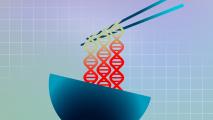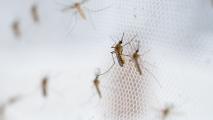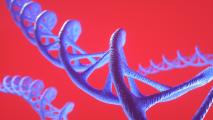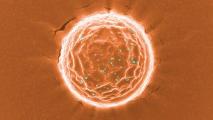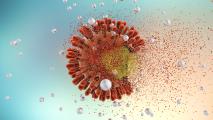
Biotech
Human history has been all but defined by death and disease, plague and pandemic. Advancements in 20th century medicine changed all of that. Now advancements in 21st century medicine promise to go even further. Could we bring about an end to disease? Reverse aging? Give hearing to the deaf and sight to the blind? The answer may be yes. And soon.
More
The DNA-based diet you’ll be hearing about everywhere
A growing field called “nutrigenomics” aims to provide people with personalized lifestyle guidance based on their DNA
Molecular "tweezers" pick apart bacterias' biofilm
Israeli researchers have developed a set of “molecular tweezers” that can pick apart the biofilm which protects some bacteria.
Your incentives to get the COVID-19 vaccine
If protection against a potentially deadly virus isn’t enough, there are these added incentives to get the COVID-19 vaccine.
Gene therapy appears to cure “bubble boy disease”
A new gene therapy designed to treat children with ADA-SCID, a form of “bubble boy disease,” was incredibly successful in trials.
Ketamine infusion: What it’s like and how it works
Ketamine infusion therapy takes the anesthetic from dance floors to depression clinics. But how does the drug work, and what is it like?
1 billion genetically modified mosquitoes will be released in the U.S.
Oxitec recently released genetically modified mosquitoes on three of the Florida Keys. The idea is that they will curb the spread of diseases by decreasing populations of Aedes aegypti.
This new gene editing technology rivals CRISPR
Researchers find a new gene-editing technology using retrons from bacterial DNA.
These "Nanotraps" can capture SARS-CoV-2
Inspired by cancer cells, researchers have developed “Nanotraps” which lock up SARS-CoV-2 for the immune system to kill it.
Hidden Brain podcast's Shankar Vedantam: Why the truth is not always helpful
His new book explores the benefits of self-deception.
MDMA for PTSD just crushed its phase 3 trial
Results from the first phase 3 trial of using MDMA for PTSD along with talk therapy found the drug to be effective.
Supercentenarians’ DNA reveals clues to human longevity
A human longevity study involving people over the age of 105 has found that genetic variants linked to DNA repair appear to contribute to a longer life.
New brain-computer interface turns mental handwriting into text
A new brain-computer interface translated a paralyzed man’s “mental handwriting” into text on a computer screen.
How a smartphone app is helping suppress HIV
An HIV app that uses gaming elements to motivate people to stick to their ART regimen was able to increase viral suppression in a small study.
3D-printed nose cartilage may someday fix your face
Researchers have developed a way to bioprint nose cartilage that they hope will one day minimize the need for invasive harvesting from the ribs.
How will movie theaters survive post-pandemic?
Chicago musician Chance the Rapper is releasing his new concert film, “Magnificent Coloring World,” exclusively through AMC Theatres.
"Octopus vision" may help prevent human blindness
A new medical device that gives optometrists a fast, easy way to monitor a key macular degeneration risk factor was inspired by octopus vision.
New blood test could predict the onset of labor
Stanford University researchers have identified blood-based biomarkers that can be used to predict the onset of labor in pregnant women.
Icy microneedle patch delivers cell therapy, then melts
A new microneedle patch features needles made of ice instead of traditional materials, making it suitable for cell therapy delivery.
These plants have been genetically modifying themselves for decades
New evidence shows that plants have been genetically modifying themselves for decades in a process called lateral gene transfer.
Four types of Alzheimer’s discovered in international study
A study has identified four distinct types of Alzheimer’s disease, based on how the tau protein spreads in patients’ brains.
Get inspired with the most innovative stories shaping the world around us.













